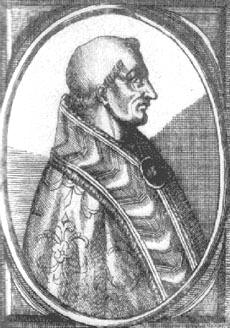 The
death of Gregory IX was good news to Emperor Frederick II, and
he loudly proclaimed his jubilation to the world. According to
Frederick's smug expression, Gregory had flouted the August One,
i.e., the Emperor, and therefore had not been allowed to live
through avenging August. Frederick expressed the hope that the
next pope would be more favorable; and to give some force to his
hope, the Emperor remained with his army threatening Rome.
The
death of Gregory IX was good news to Emperor Frederick II, and
he loudly proclaimed his jubilation to the world. According to
Frederick's smug expression, Gregory had flouted the August One,
i.e., the Emperor, and therefore had not been allowed to live
through avenging August. Frederick expressed the hope that the
next pope would be more favorable; and to give some force to his
hope, the Emperor remained with his army threatening Rome.
Meanwhile in Rome the senator Matteo Rosso Orsini promptly
confined the cardinals in the Septizonium to hurry them on to an
election. This appears to be the first conclave in the strict
sense of the word, that is, the locking up of the cardinals
until they had elected a pope. Though Frederick withdrew his
army into Apulia, the cardinals had a hard time coming to a
decision. Cardinal Godfrey Castiglioni took an early lead in the
balloting but was unable to command the necessary twothirds
majority. When the Romans heard the rumor that the cardinals
were going to elect an outsider as a compromise, a mob insulted
the conclave. Indeed it is said that the Romans threatened to
dig up the corpse of Pope Gregory and put it in with the
cardinals if they did not elect one of their number. Through the
frightful heat of August and September into October the conclave
struggled. At last on October 25, 1241, Godfrey Castiglioni
gained the necessary majority. He accepted and chose the name
Celestine IV.
Godfrey Castiglioni was born in Milan, the son of John
Castiglioni and Cassandra Crivelli, the sister of Urban III. He
entered the rank of the clergy and rose to be a canon and
chancellor of the church of Milan. In 1187 he resigned his
honors to enter the Cistercian monastery of Hautecombe. There he
is said to have written a History of the Kingdom of Scotland.
Forty years later, in 1227, Gregory IX made him cardinal-priest
of St. Mark, and twelve years later still, in 1239, Gregory made
him cardinal-bishop of Sabina. He must have been a very old man
indeed when elected pope.
His advanced age and weak health were probably the chief
reasons why the divided cardinals agreed at last on Celestine.
He might have made a good pope, for he was an excellent
theologian and was charitable to the poor, but he had no time to
prove his ability. The sick old man lasted exactly seventeen
days as pope. On November 10, 1241, Celestine IV died. His death
was the signal for most of the cardinals to hurry out of Rome,
because they had no wish to undergo another ordeal like the last
conclave. The few cardinals who remained buried Celestine IV in
St. Peter's on November ll.

